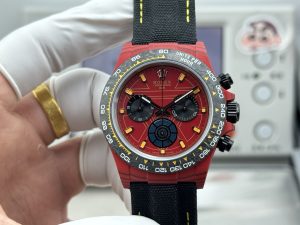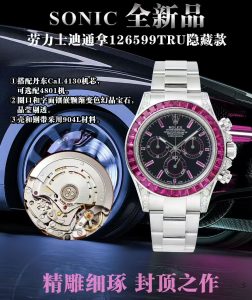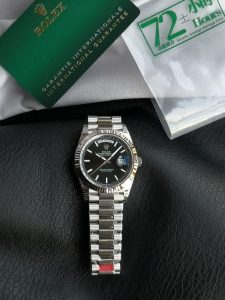The ZF Factory’s rendition of the iconic IWC Portuguese Chronograph, featuring a white dial and gold markers with a solid back, has emerged as a compelling option for watch enthusiasts. Measuring 41mm in diameter and 13mm in thickness, this replica watch houses a custom Cal. 69355 movement. In this article, we delve into the facets that make this watch a noteworthy discussion point amid the luxury and replica sectors.
Decoding the Design Aesthetic
The original IWC Portuguese Chronograph is revered for its minimalist yet sophisticated design, which is masterfully emulated by the ZF Factory. The clean white dial, accented by gold indices and hands, encapsulates an elegance that resonates with classic watch aficionados. The watch’s measurements strike a balance between presence and comfort, making it versatile for various wrist sizes.
Interestingly, the replica delves into a broader conversation on how luxury aesthetics are perceived and consumed. While the genuine model stands as a symbol of prestige, the replica offers an accessible pathway to similar styling and craftsmanship, challenging the notions of exclusivity.
The Mechanics Behind the Replica
At the heart of this timepiece is the custom Cal. 69355 movement, a homage to the intricate mechanics of the original. Although lacking the prestige of in-house IWC calibers, it provides sufficient accuracy and reliability for everyday wear. This diverges from purist perspectives but aligns with practical consumer values—a reliable timekeeper without the exorbitant cost.
In examining the mechanics, the discussion naturally shifts towards ethical considerations. Critics may argue that replica watches undermine the artistry and innovation of authentic pieces, yet the counterargument recognizes a market responsive to those priced out of luxury goods, seeking attainable alternatives.
Branding and Economic Considerations
IWC’s branding is built on a legacy of precision and heritage, with the Portuguese line epitomizing nautical craftsmanship. The ZF replica leverages this narrative, offering an aesthetic connection to that storied past without the economic exclusivity. It prompts a reevaluation of brand value—is it the craftsmanship alone, or the private club of ownership?
From an economic standpoint, replicas present an intriguing case of value perception. While luxury watches can appreciate over time or serve as status symbols, their replicas challenge the investment narrative. The affordable replica aims to fulfill the desire for luxury at an economically feasible price, prompting a broader reflection on what constitutes real value in the watch industry.
Psychological Perspectives
The choice between a genuine IWC Portuguese and its replica counterpart often extends into psychological realms. Authentic watches are status signals, indicative of wealth and taste. Replicas, on the other hand, might be seen as a defiance against consumerism—a statement that style and personal satisfaction aren’t confined to price tags.
Critics might propose that the allure of replicas stems from a form of self-expression, or perhaps a psychological rebellion against societal expectations of luxury. Opting for a replica can be viewed as a conscious choice to prioritize personal satisfaction over societal validation.
Ethical Implications and Conclusions
The ethics of replicas remain hotly debated. While they clearly tread on intellectual property, they also democratize the access to luxury aesthetics. This duality reflects a broader societal discourse on ownership, intellectual property, and access to life’s finer things.
In conclusion, the ZF Portuguese Chronograph replica is not just a watch—it is a case study in modern luxury consumption, blending craftsmanship, accessibility, and ethical debate. It offers individuals a choice that goes beyond mere timekeeping and enters a realm of personal value and societal identity.












